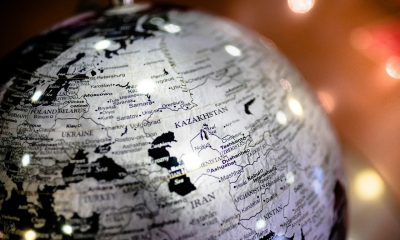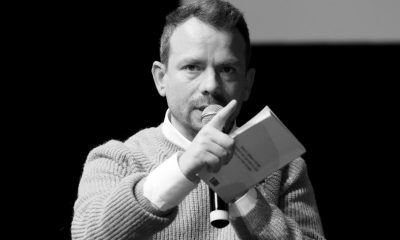EU
#StateAid: קאמיסיע טרעפט אז שפאניע'ס שטיצע פאר פריוואטע טעלעוויזיע בראָדקאַסטערס אין ברעכן די אי.יו. כּללים

 The European Commission has found that a Spanish scheme compensating terrestrial private broadcasters for carrying out parallel broadcasting during the digitization of the terrestrial television signal is in breach of EU state aid rules. As no aid has been granted yet, no recovery will be required.
The European Commission has found that a Spanish scheme compensating terrestrial private broadcasters for carrying out parallel broadcasting during the digitization of the terrestrial television signal is in breach of EU state aid rules. As no aid has been granted yet, no recovery will be required.
Competition Commission Margrethe Vestager said: "This measure provided a selective advantage to terrestrial broadcasters and platform operators over other available technologies. This goes against the principle of technological neutrality and does not appear necessary or proportionate. Spain has already completed the digital frequency switch with no state aid having been granted. Therefore, no recovery will be required."
The switch from analogue to digital broadcasting released radio frequency spectrum previously used for TV broadcasting (the so called "digital dividend''). In this context, Spain imposed a "simulcast" obligation on broadcasters, requiring them to broadcast both analogue and digital signals during the transitional period, in order to avoid service disruptions for viewers.
In 2011, the Spanish authorities notified plans to compensate broadcasters for additional costs incurred due to this "simulcast" obligation. In אפריל קסנומקס, the Commission opened an in-depth state aid investigation. In the course of the investigation, Spain withdrew part of the notification concerning public broadcasters, as compensation in their favour was already granted as part of their public service mission; the investigation continued solely for private broadcasters. The decision therefore concerns only them.
EU state aid rules allow member states to support the reallocation of radio spectrum and to mitigate its impact on operators. They can, in particular, offer compensation for costs that operators, in the case of a proven market failure, could not be expected to carry themselves absent the need for the migration. To avoid any undue distortion of competition, such measures must be necessary for reaching the assigned objective. The aid granted needs to be proportionate to the goals and the measure must be technologically neutral, in other words the subsidy must be open to all operators.
The Commission's investigation confirmed that Spain's support for the transition from analogue to digital TV broadcasting was offered only to digital terrestrial (DTT) broadcasters to the detriment of alternative platforms, such as satellite, cable or IPTV (TV over Internet Protocol). Spain did not substantiate why the principle of technological neutrality would not be justified in this case. Any exception to this principle would have to be duly justified, for example, on the basis of an ex ante independent study, combined with a market consultation, demonstrating the efficiency of the DTT platform over alternative platforms.
Spain also failed to demonstrate that public support for the frequency reallocation was needed to ensure a smooth transfer from analogue to digital broadcasting. On the contrary, the Commission found that private broadcasters would have ensured simulcast in any event, so as not to lose viewers. Moreover, Spain provided no evidence, such as an independent cost study, showing that the aid was proportionate.
Therefore, the Commission concluded that the measure selectively favoured terrestrial broadcasters as well as platform operators to the detriment of broadcasters and operators representing alternative platforms and thereby distorted competition in the Single Market. As no aid has been granted yet, no recovery will be required.
Spain has now completed the frequency switch and private broadcasters have ensured and financed the simulcast proactively, with no state aid having been needed or granted.
הינטערגרונט
To address the significant growth in demand for wireless broadband services in the European Union, the Commission אין פעברואר 2016 proposed legislation aimed at boosting wireless broadband services with high-quality radio frequencies. The proposal provides for better co-ordination of spectrum management at European level and calls on all member states to reallocate the 700MHz spectrum band, currently used for TV broadcasting, to wireless broadband by June 2020. This will improve wireless internet access for all Europeans, help develop cross-border applications and ease the deployment of 5G.
Several member states have granted State aid in the context of this digital switchover. In particular, aid was granted to support socially disadvantaged households to purchase new decoders. Where the principles of technological neutrality, necessity and proportionality were respected, such measures could be approved by the Commission.
In 2011, Spain notified to the Commission for state aid scrutiny two separate measures concerning the digital switchover. One concerned the measure subject to today's decision. The other concerned subsidies for residents of collective buildings who needed to upgrade the existing digital terrestrial television infrastructure or switch to another platform. The Commission found the measure to be in line with state aid rules, because it ensured the continuity of households' TV coverage while allowing them to use the platform of their choice.
די ניט-געהיים ווערסיע פון דעם באַשלוס וועט זיין געמאכט פאַראַנען אונטער די פאַל נומער סאַ.32619 אין די שטאַט הילף רעגיסטרירן אויף די דג קאַמפּאַטישאַן וועבזייַטל אַמאָל קיין קאָנפידענטיאַליטי ישוז האָבן שוין ריזאַלווד. ניו אויסגאבעס פון שטאַט הילף דיסיזשאַנז אויף די אינטערנעט און אין דער באַאַמטער דזשאָורנאַל זענען ליסטעד אין די שטאַט הילף וויקלי E-News.
שער דעם אַרטיקל:
-

 באַנגלאַדעשקסנומקס טעג צוריק
באַנגלאַדעשקסנומקס טעג צוריקבאַנגלאַדעש פרעמד מיניסטער פירט ינדעפּענדענסע און נאַשאַנאַל טאָג סימכע אין בריסל צוזאַמען מיט באַנגלאַדעש נאַשנאַלז און פרעמד פרענדז
-

 קאנפליקטןקסנומקס טעג צוריק
קאנפליקטןקסנומקס טעג צוריקקאַזאַכסטאַן טרעט אריין: ברידגינג די צעטיילונג פון אַרמעניאַ-אַזערביידזשאַן
-

 רומעניעקסנומקס טעג צוריק
רומעניעקסנומקס טעג צוריקפֿון Ceausescu's Orphanage, צו ציבור אָפיס - אַ געוועזענער יתום שטרעבט איצט צו ווערן בירגער - מייַסטער פון קאַמיוניטי אין דרום רומעניע.
-

 קאַזאַקסטאַןקסנומקס טעג צוריק
קאַזאַקסטאַןקסנומקס טעג צוריקוואַלאַנטירז אַנטדעקן בראָנדז אַגע פּעטראָגליפס אין קאַזאַכסטאַן בעשאַס ענוויראָנמענטאַל קאַמפּיין






















